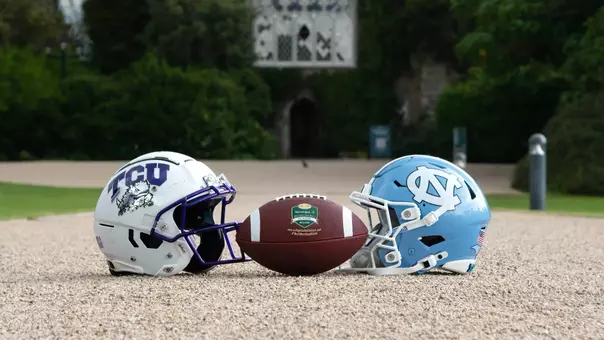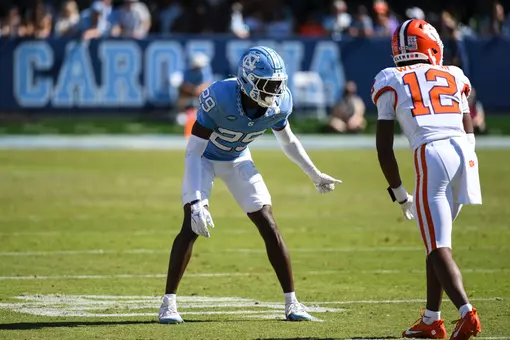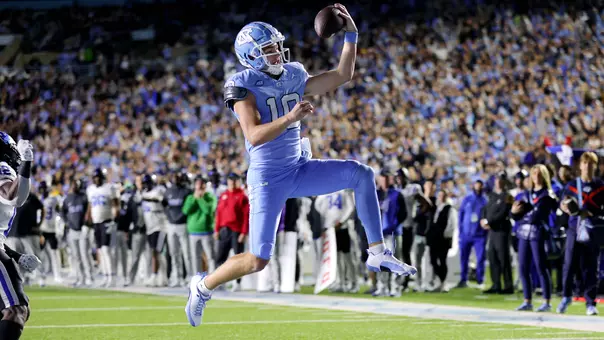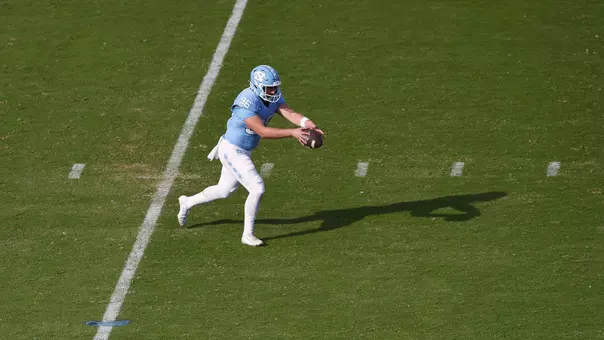University of North Carolina Athletics
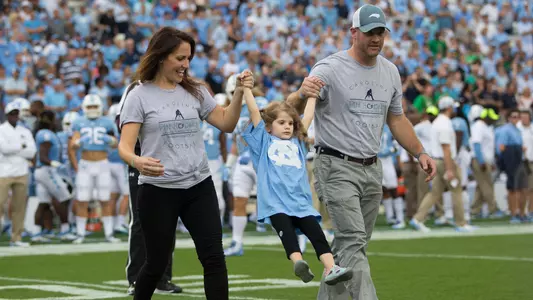
Brooke, Logan & David Bomar in Kenan Stadium on Nov. 7.
GoHeels Exclusive: UNC Football Family Embraces Fight Against Pitt Hopkins Syndrome
October 13, 2017 | Football, Featured Writers
by Pat James
They stand on the North Carolina sideline, hand in hand, preparing to take the Kenan Stadium field before Saturday's Notre Dame game.
For David Bomar, a Tar Heel safety from 1996-2000 who grew up modeling his father, former UNC quarterback Gayle Bomar, the setting is familiar. His wife, Brooke, the middle daughter of former tailback Don McCauley, also knows it well.
But this moment isn't for them. Nor is it for their families. This is for her – their 5-year-old daughter Logan, standing between her parents and grasping their hands.
Quick hellos are exchanged with Brandon Fritts and the rest of the Tar Heels' captains. And then it's on their way, up the 50-yard line, for the coin toss, an honor bestowed on Logan as the UNC Children's Hospital Kids Champion.
In November 2015, Logan was diagnosed with Pitt Hopkins syndrome (PTHS), a rare genetic disorder caused by a mutation of a specific gene, called TCF4, in chromosome 18. According to the Pitt Hopkins Research Foundation (PHRF), there are approximately 700 individuals diagnosed worldwide.
Still, Logan is just like any other girl her age. She has a beautiful smile, accompanied by a heartwarming giggle. She loves balloons and horses and music. And on this day, her brown hair is pulled back in pigtails, flapping in the breeze as Brooke and David lift her by the arms with each step they take toward midfield.
Logan can walk by herself, just a few steps at a time right now. PTHS is characterized by significant developmental delays, such as problems with motor coordination and balance. Breathing abnormalities and seizures are also common – Logan experiences neither.
As is the case for most people with PTHS, Logan's biggest obstacle is communication. She currently doesn't talk. She expresses herself with her eyes and hand gestures, though, and could still develop a limited vocabulary.
Sometimes no one knows what Logan's thinking, David said. But in the middle of Kenan Stadium, the football mecca for the Bomars and McCauleys, she appears in awe.
"It'll be something that we'll be talking about for the rest of her life," David said. "I'm just so thankful that we got the opportunity."
Moments later, the game kicks off. The Bomars return to the Blue Zone, the spotlight fades. But their mission of spreading awareness about PTHS endures.
Building a family
As a senior in 1968, Gayle set the ACC record for total offense in a game with 416 yards against Wake Forest. His 173 rushing yards represented a UNC single-game record.
Don, then a sophomore, was limited to just 75 carries for 360 yards during the 1968 season. But a year later, he rushed for 188 yards against the Demon Deacons, surpassing his future in-law's mark.
"He was like my hero," Don said. "Just the way he conducted himself on and off the field, I was always a big fan of his."
The 1968 season was the only one they played together. Gayle, a wealth management associate at Morgan Stanley in Chapel Hill, went into finance. Don, the director of scholarship donor relations for the Rams Club, finished his Tar Heel career with 3,172 rushing yards, the fifth most in school history, and played 11 NFL seasons with the Baltimore Colts.
Over the next few decades, they lost touch, excluding occasional chats at letterman functions. But about 12 years ago, shortly after Don and his wife, Tracey, returned to Chapel Hill, they reconnected.
Gayle and David then worked at Wachovia Securities. And one day, Tracey visited the office, where David introduced himself. A few hours later, Tracey called Gayle.
"She said, 'Hey, it was really great to see your son David. Is he dating anybody?'" Gayle recalled. "I said, 'No, not at the time.' I was kind of like, 'Oh, my God, where is this going?' But she said, 'He and our middle daughter Brooke are the same age. Next time she comes down to visit us, we ought to introduce them.'"
Gayle hesitated. He had never organized a date for any of his four children – the others being J.P. (a UNC safety from 1998-2000), Darley (a member of the UNC dance team from 1993-96) and Jenny (a UNC cheerleader from 1991-93). But he and Tracey agreed to swap pictures of Brooke and David.
The following day, Gayle left for a golf trip, granting David access to his email account before departing. A few hours later, David called. He had discovered Gayle's emails with Tracey.
"I was a little bit perturbed," David said, "until I was able to open some pictures that were attached to some of the emails and got to see Tracey's beautiful daughter. I told him he was doing a good job."
Shortly after, Brooke flew down from New York to visit Don for Father's Day. She and David went on a date, which included stops at Top of the Hill and 411 West. They ultimately married and had their first child, Jack, in 2009.
Three years later, they welcomed Logan.
"She just had a sweet little face," Brooke said. "She slept a lot, she did everything she was supposed to. We were just thrilled to have a little girl in the family. Her older brother was there, and he just fell in love with her. It was just a perfect day."
'The great search'
Brooke and David initially didn't notice anything unusual about Logan. But around 6 months old, she hadn't hit a few of her developmental milestones.
They expressed their concerns to their pediatrician. "Kids are going to do things when they're going to do them," he told them. He recommended they continue tracking Logan's progress. But after three more months, little changed.
"We kind of said to ourselves, 'Something is not right,'" David said. "That kind of spawned the great search."
Brooke spent every day on the computer, looking for an answer. Maybe Logan had an allergy. Maybe she wasn't getting enough of a certain vitamin. Family members called at least once every other week to mention an article they'd found. "It could be this," they said. But it wasn't.
Doctors gave the Bomars varying opinions. Some said Logan would eventually catch up. Others said it was likely a genetic disorder. Brooke and David went through their pediatrician's entire medical book, and for anything that looked like a possibility, they tried treatment for it, as long it was noninvasive and wouldn't have long-term effects.
"We were hoping we would find something," Brooke said. "But at the same time, we were hoping she would just catch up."
She didn't. The weight of the unknown hung over the entire family, especially David.
Shortly after Logan's birth, David said she fell after he left her unattended for a few minutes. A trip the emergency room followed. But that wasn't as anguishing as the thought that he was to blame for Logan's developmental delays.
"That was pretty tough for me," he said, "that I might be responsible for some of the hardships she was going through."
Finally, in November 2015 – about 2 1/2 years after their search began – the Bomars received an answer. Dr. Yong-Hui Jiang, an associate professor of pediatrics and neurobiology at Duke, diagnosed Logan with PTHS.
Relief swept over Brooke and David. But new questions emerged. What would this mean for Logan? How would it affect the rest of the family?
"We definitely had the black cloud over us and felt very distraught and kind of, 'What now?'" Brooke said. "We just said, 'Well, this is what God has given us and there's a reason for this. So we're just going to go and not let it affect our lives. We're just going to be normal.'"
An inspiration
Theresa Pauca, a 1990 UNC graduate, felt the same emotions as the Bomars when her son, Victor, was diagnosed with PTHS in 2008.
At that time, Victor, then 2 years old, was one of the first children in the United States given a PTHS diagnosis. According to research journals – which Theresa said only included the most severe cases – he'd never walk, never talk and possibly be tube-fed. Not all of that held true.
The Paucas ultimately learned PTHS is on the autism spectrum. Thus, affected individuals experience symptoms in varying degrees. But this knowledge wasn't widespread.
"We thought, 'This is just so awful for people to get this diagnosis,'" said Theresa, of Winston-Salem. "'What if their child is a newborn and they think they're never going to be able to do these things and don't push as much as they could with therapies and things like that?'"
With this in mind, the Paucas helped start a support group for families on Google Groups. In May 2010, they began raising money for PTHS research by establishing a fund under the Winston-Salem Foundation. They co-founded the PHRF three years later.
Brooke registered Logan on the PHRF website the day after her diagnosis. Within hours, Brooke received a phone call and email from Theresa and Audrey Davidow Lapidus, the president of the PHRF, inviting the Bomars to their upcoming Thanksgiving dinner. A lifeline was formed.
The Bomars regularly communicate with members of the PHRF through a private Facebook group, where families answer questions and swap stories. They also engage in fundraising.
For the last two years, the Bomars have joined the PHRF's team for the Million Dollar Bike Ride, held by the University of Pennsylvania's Orphan Disease Center (ODC). Teams that raise $20,000-50,000 have their funds matched by the ODC.
But it's not just Brooke and David who are involved with bringing awareness to PTHS. The rest of the Bomars and McCauleys are, too.
This spring, Logan's cousin Caroline Harris, then a senior in high school, conducted a project on raising awareness and funds for PTHS. It included a dance-a-thon, which was held at her home in High Point and raised about $15,000 for the PHRF. Caroline, now a UNC freshman, made her dance team debut Saturday.
"Talk about a tight-knit family," David said. "To have a child who's still in high school working on behalf of your child, that's amazing."
Among the guests at the dance-a-thon and also standing on the Tar Heels' sideline Saturday was Dr. Ben Philpot, the associate director of the UNC Neuroscience Center.
The Bomars first contacted Philpot, who started studying PTHS about five years ago, shortly after Logan's diagnosis. Within a few weeks, the family was touring his lab and discussing his team's findings. That marked the first of what have become fairly regular meetings.
"Just being able to meet Logan and her wonderful family," Philpot said, "it's great inspiration for me. It allows me to take that as motivation back into the lab."
Last year, the PHRF awarded its first gene therapy grant to Philpot and Dr. Steven Gray, an assistant professor in the department of ophthalmology and a researcher in UNC's Gene Therapy Center and Carolina Institute for Developmental Disabilities. If feasible, a gene therapy approach would allow doctors to treat PTHS by replacing the mutated TCF4 gene.
But until that, another treatment option or a cure exists, the Bomars will wait. They'll hope. And they'll keep pushing Logan through grueling therapy appointments, attempting to open doors for her that might have at one point seemed permanently shut.
"Logan is my inspiration," Brooke said. "She gives me strength when I feel I have nothing left, she reminds me that anything is possible and she has shown all of us what beauty and love really is. She simply is the best person I know."
Everything the Bomars do is for Logan. And it always will be.
They stand on the North Carolina sideline, hand in hand, preparing to take the Kenan Stadium field before Saturday's Notre Dame game.
For David Bomar, a Tar Heel safety from 1996-2000 who grew up modeling his father, former UNC quarterback Gayle Bomar, the setting is familiar. His wife, Brooke, the middle daughter of former tailback Don McCauley, also knows it well.
But this moment isn't for them. Nor is it for their families. This is for her – their 5-year-old daughter Logan, standing between her parents and grasping their hands.
Quick hellos are exchanged with Brandon Fritts and the rest of the Tar Heels' captains. And then it's on their way, up the 50-yard line, for the coin toss, an honor bestowed on Logan as the UNC Children's Hospital Kids Champion.
In November 2015, Logan was diagnosed with Pitt Hopkins syndrome (PTHS), a rare genetic disorder caused by a mutation of a specific gene, called TCF4, in chromosome 18. According to the Pitt Hopkins Research Foundation (PHRF), there are approximately 700 individuals diagnosed worldwide.
Still, Logan is just like any other girl her age. She has a beautiful smile, accompanied by a heartwarming giggle. She loves balloons and horses and music. And on this day, her brown hair is pulled back in pigtails, flapping in the breeze as Brooke and David lift her by the arms with each step they take toward midfield.
Logan can walk by herself, just a few steps at a time right now. PTHS is characterized by significant developmental delays, such as problems with motor coordination and balance. Breathing abnormalities and seizures are also common – Logan experiences neither.
As is the case for most people with PTHS, Logan's biggest obstacle is communication. She currently doesn't talk. She expresses herself with her eyes and hand gestures, though, and could still develop a limited vocabulary.
Sometimes no one knows what Logan's thinking, David said. But in the middle of Kenan Stadium, the football mecca for the Bomars and McCauleys, she appears in awe.
"It'll be something that we'll be talking about for the rest of her life," David said. "I'm just so thankful that we got the opportunity."
Moments later, the game kicks off. The Bomars return to the Blue Zone, the spotlight fades. But their mission of spreading awareness about PTHS endures.
Building a family
As a senior in 1968, Gayle set the ACC record for total offense in a game with 416 yards against Wake Forest. His 173 rushing yards represented a UNC single-game record.
Don, then a sophomore, was limited to just 75 carries for 360 yards during the 1968 season. But a year later, he rushed for 188 yards against the Demon Deacons, surpassing his future in-law's mark.
"He was like my hero," Don said. "Just the way he conducted himself on and off the field, I was always a big fan of his."
The 1968 season was the only one they played together. Gayle, a wealth management associate at Morgan Stanley in Chapel Hill, went into finance. Don, the director of scholarship donor relations for the Rams Club, finished his Tar Heel career with 3,172 rushing yards, the fifth most in school history, and played 11 NFL seasons with the Baltimore Colts.
Over the next few decades, they lost touch, excluding occasional chats at letterman functions. But about 12 years ago, shortly after Don and his wife, Tracey, returned to Chapel Hill, they reconnected.
Gayle and David then worked at Wachovia Securities. And one day, Tracey visited the office, where David introduced himself. A few hours later, Tracey called Gayle.
"She said, 'Hey, it was really great to see your son David. Is he dating anybody?'" Gayle recalled. "I said, 'No, not at the time.' I was kind of like, 'Oh, my God, where is this going?' But she said, 'He and our middle daughter Brooke are the same age. Next time she comes down to visit us, we ought to introduce them.'"
Gayle hesitated. He had never organized a date for any of his four children – the others being J.P. (a UNC safety from 1998-2000), Darley (a member of the UNC dance team from 1993-96) and Jenny (a UNC cheerleader from 1991-93). But he and Tracey agreed to swap pictures of Brooke and David.
The following day, Gayle left for a golf trip, granting David access to his email account before departing. A few hours later, David called. He had discovered Gayle's emails with Tracey.
"I was a little bit perturbed," David said, "until I was able to open some pictures that were attached to some of the emails and got to see Tracey's beautiful daughter. I told him he was doing a good job."
Shortly after, Brooke flew down from New York to visit Don for Father's Day. She and David went on a date, which included stops at Top of the Hill and 411 West. They ultimately married and had their first child, Jack, in 2009.
Three years later, they welcomed Logan.
"She just had a sweet little face," Brooke said. "She slept a lot, she did everything she was supposed to. We were just thrilled to have a little girl in the family. Her older brother was there, and he just fell in love with her. It was just a perfect day."
'The great search'
Brooke and David initially didn't notice anything unusual about Logan. But around 6 months old, she hadn't hit a few of her developmental milestones.
They expressed their concerns to their pediatrician. "Kids are going to do things when they're going to do them," he told them. He recommended they continue tracking Logan's progress. But after three more months, little changed.
"We kind of said to ourselves, 'Something is not right,'" David said. "That kind of spawned the great search."
Brooke spent every day on the computer, looking for an answer. Maybe Logan had an allergy. Maybe she wasn't getting enough of a certain vitamin. Family members called at least once every other week to mention an article they'd found. "It could be this," they said. But it wasn't.
Doctors gave the Bomars varying opinions. Some said Logan would eventually catch up. Others said it was likely a genetic disorder. Brooke and David went through their pediatrician's entire medical book, and for anything that looked like a possibility, they tried treatment for it, as long it was noninvasive and wouldn't have long-term effects.
"We were hoping we would find something," Brooke said. "But at the same time, we were hoping she would just catch up."
She didn't. The weight of the unknown hung over the entire family, especially David.
Shortly after Logan's birth, David said she fell after he left her unattended for a few minutes. A trip the emergency room followed. But that wasn't as anguishing as the thought that he was to blame for Logan's developmental delays.
"That was pretty tough for me," he said, "that I might be responsible for some of the hardships she was going through."
Finally, in November 2015 – about 2 1/2 years after their search began – the Bomars received an answer. Dr. Yong-Hui Jiang, an associate professor of pediatrics and neurobiology at Duke, diagnosed Logan with PTHS.
Relief swept over Brooke and David. But new questions emerged. What would this mean for Logan? How would it affect the rest of the family?
"We definitely had the black cloud over us and felt very distraught and kind of, 'What now?'" Brooke said. "We just said, 'Well, this is what God has given us and there's a reason for this. So we're just going to go and not let it affect our lives. We're just going to be normal.'"
An inspiration
Theresa Pauca, a 1990 UNC graduate, felt the same emotions as the Bomars when her son, Victor, was diagnosed with PTHS in 2008.
At that time, Victor, then 2 years old, was one of the first children in the United States given a PTHS diagnosis. According to research journals – which Theresa said only included the most severe cases – he'd never walk, never talk and possibly be tube-fed. Not all of that held true.
The Paucas ultimately learned PTHS is on the autism spectrum. Thus, affected individuals experience symptoms in varying degrees. But this knowledge wasn't widespread.
"We thought, 'This is just so awful for people to get this diagnosis,'" said Theresa, of Winston-Salem. "'What if their child is a newborn and they think they're never going to be able to do these things and don't push as much as they could with therapies and things like that?'"
With this in mind, the Paucas helped start a support group for families on Google Groups. In May 2010, they began raising money for PTHS research by establishing a fund under the Winston-Salem Foundation. They co-founded the PHRF three years later.
Brooke registered Logan on the PHRF website the day after her diagnosis. Within hours, Brooke received a phone call and email from Theresa and Audrey Davidow Lapidus, the president of the PHRF, inviting the Bomars to their upcoming Thanksgiving dinner. A lifeline was formed.
The Bomars regularly communicate with members of the PHRF through a private Facebook group, where families answer questions and swap stories. They also engage in fundraising.
For the last two years, the Bomars have joined the PHRF's team for the Million Dollar Bike Ride, held by the University of Pennsylvania's Orphan Disease Center (ODC). Teams that raise $20,000-50,000 have their funds matched by the ODC.
But it's not just Brooke and David who are involved with bringing awareness to PTHS. The rest of the Bomars and McCauleys are, too.
This spring, Logan's cousin Caroline Harris, then a senior in high school, conducted a project on raising awareness and funds for PTHS. It included a dance-a-thon, which was held at her home in High Point and raised about $15,000 for the PHRF. Caroline, now a UNC freshman, made her dance team debut Saturday.
"Talk about a tight-knit family," David said. "To have a child who's still in high school working on behalf of your child, that's amazing."
Among the guests at the dance-a-thon and also standing on the Tar Heels' sideline Saturday was Dr. Ben Philpot, the associate director of the UNC Neuroscience Center.
The Bomars first contacted Philpot, who started studying PTHS about five years ago, shortly after Logan's diagnosis. Within a few weeks, the family was touring his lab and discussing his team's findings. That marked the first of what have become fairly regular meetings.
"Just being able to meet Logan and her wonderful family," Philpot said, "it's great inspiration for me. It allows me to take that as motivation back into the lab."
Last year, the PHRF awarded its first gene therapy grant to Philpot and Dr. Steven Gray, an assistant professor in the department of ophthalmology and a researcher in UNC's Gene Therapy Center and Carolina Institute for Developmental Disabilities. If feasible, a gene therapy approach would allow doctors to treat PTHS by replacing the mutated TCF4 gene.
But until that, another treatment option or a cure exists, the Bomars will wait. They'll hope. And they'll keep pushing Logan through grueling therapy appointments, attempting to open doors for her that might have at one point seemed permanently shut.
"Logan is my inspiration," Brooke said. "She gives me strength when I feel I have nothing left, she reminds me that anything is possible and she has shown all of us what beauty and love really is. She simply is the best person I know."
Everything the Bomars do is for Logan. And it always will be.
Players Mentioned
UNC Baseball: Tar Heels Shut Down Richmond, 10-0
Wednesday, February 18
WBB: Post-Duke Conference - Feb. 15, 2026
Sunday, February 15
UNC Women's Basketball: Tar Heels Fall at Duke, 72-68
Sunday, February 15
UNC Men's Lacrosse: Tar Heels Cruise Past Iona, 23-7
Sunday, February 15











